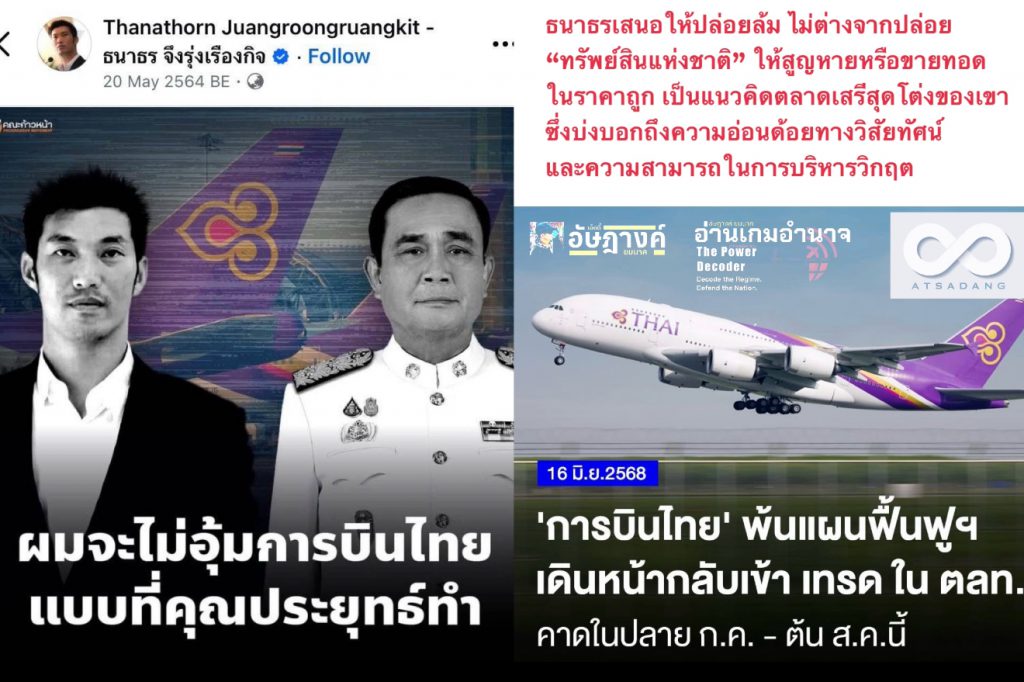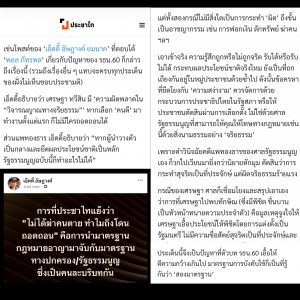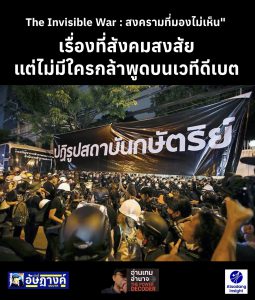
ความอ่อนด้อยทางวิสัยทัศน์และความสามารถในการบริหารวิกฤตของธนาธร
โดย อัษฎางค์ยมนาค #อ่านเกมอำนาจ
ธนาธรเสนอให้ปล่อยล้ม ไม่ต่างจากปล่อย “ทรัพย์สินแห่งชาติ” ให้สูญหายหรือขายทอดในราคาถูก เป็นแนวคิดตลาดเสรีสุดโต่งของเขาซึ่งบ่งบอกถึงความอ่อนด้อยทางวิสัยทัศน์และความสามารถในการบริหารวิกฤต
ช่วยแปลงเป็นเวอร์ชั่นภาษาอังกฤษ สำนวนสื่อสารมวลชน
▍ ทำไมรัฐบาลควร “อุ้ม” การบินไทยในช่วงวิกฤต?
→ 1. การบินไทยไม่ใช่แค่รัฐวิสาหกิจ — แต่เป็น Strategic National Asset
• การบินไทยเป็นสายการบินแห่งชาติ (Flag Carrier) ที่มีบทบาทด้านยุทธศาสตร์ เช่น การขนส่งฉุกเฉิน, ภารกิจช่วยเหลือคนไทยในต่างแดน, การสร้างภาพลักษณ์ประเทศ
• หากปล่อยให้ล้มละลายหรือถูกเทกโอเวอร์โดยต่างชาติ จะทำให้ไทยขาดความสามารถในการควบคุม “Soft Power” ด้านการบินในระดับนานาชาติ
→ 2. ระบบห่วงโซ่อุปทานและแรงงานจำนวนมากขึ้นอยู่กับการบินไทย
• เครือข่ายธุรกิจที่เกี่ยวข้อง เช่น ซัพพลายเออร์, พนักงาน, สนามบิน, การท่องเที่ยว ล้วนเชื่อมโยงกับการบินไทย
• การปล่อยล้มละลายจะสร้างโดมิโนต่อเศรษฐกิจจริง มากกว่าที่คนทั่วไปคาด
→ 3. การฟื้นฟูโดยใช้กลไกกฎหมายล้มละลาย (ไม่ใช่การอุ้มแบบไม่จำกัด) เป็นแนวทางที่ยั่งยืน
• รัฐบาลประยุทธ์ไม่ได้อุ้มแบบ “ใส่เงินเรื่อย ๆ” แต่ใช้กระบวนการฟื้นฟูภายใต้คำสั่งศาล มีแผนฟื้นฟูจากเจ้าหนี้ มีการลดขนาดฝูงบิน-ลดหนี้-ปรับโครงสร้าง
• การบินไทยอยู่รอดโดยมีเจ้าหนี้และตลาดทุนร่วมรับภาระ ไม่ใช่แค่ภาษีประชาชนล้วน ๆ
▍ ทำไม “ไม่ควรอุ้ม” แบบที่คุณธนาธรเสนอ จึงอาจผิดพลาดในเชิงยุทธศาสตร์?
→ 1. ความเข้าใจที่ว่าการบินไทยคือองค์กรสิ้นเปลืองของรัฐ มองเพียงมุมการเงิน
• ธนาธรเสนอโมเดล “ตัดขาดทุน-ปล่อยล้มละลาย” ซึ่งอาจเหมาะในภาคเอกชนทั่วไป
• แต่มองข้ามมิติยุทธศาสตร์ประเทศและ “ทรัพย์สินทางภาพลักษณ์” ที่รัฐจำเป็นต้องรักษา
→ 2. แนวคิดตลาดเสรีสุดโต่งไม่เหมาะกับสถานการณ์วิกฤต
• ในสถานการณ์โควิด-19 สายการบินทั่วโลกรับการสนับสนุนจากรัฐบาล เช่น Lufthansa, Air France, Singapore Airlines
• ธนาธรเสนอให้ปล่อยล้ม ไม่ต่างจากปล่อย “ทรัพย์สินแห่งชาติ” ให้สูญหายหรือขายทอดในราคาถูก
→ 3. การเสนอขายทิ้งหรือล้มเลิก = เสียเปรียบในเชิงอำนาจต่อรอง
• ถ้ารัฐแสดงท่าที “ไม่อุ้ม” ตั้งแต่ต้น จะไม่มีอำนาจต่อรองกับเจ้าหนี้-ผู้ถือหุ้น-คู่ค้า
• การรักษาความน่าเชื่อถือ (creditworthiness) ของรัฐก็จะถูกกระทบ
▍ สรุปเชิงกลยุทธ์:
“อุ้ม” ไม่ได้แปลว่า “ประคบประหงมไม่ให้ล้ม” — แต่คือการ “บริหารทรัพย์สินเชิงยุทธศาสตร์ให้รอดและโตต่อได้โดยไม่สร้างภาระประชาชน”
การที่วันนี้การบินไทยฟื้นคืนสภาพ และจะกลับเข้าเทรดในตลาดหลักทรัพย์ได้ คือหลักฐานว่าแนวทางฟื้นฟูของรัฐภายใต้รัฐบาลประยุทธ์ (ผ่านศาลล้มละลาย) ได้ผล และเป็นทางสายกลางระหว่าง “อุ้มจนล้ม” กับ “ปล่อยล้มจนขายชาติ”
▍พล.อ.ประยุทธ์ เป็นผู้มีบทบาทสำคัญในการผลักดันให้การบินไทยเข้าสู่กระบวนการฟื้นฟูกิจการ
พล.อ.ประยุทธ์ จันทร์โอชา ในฐานะนายกรัฐมนตรีและหัวหน้ารัฐบาลเป็นผู้มีบทบาทสำคัญในการผลักดันให้การบินไทยเข้าสู่กระบวนการฟื้นฟูกิจการ โดยเมื่อวันที่ 19 พฤษภาคม 2563 คณะรัฐมนตรีในรัฐบาลประยุทธ์มีมติให้การบินไทยเข้าสู่กระบวนการฟื้นฟูฯ ภายใต้ พ.ร.บ.ล้มละลาย พ.ศ. 2483 ซึ่งถือเป็นการแก้ไขปัญหาขาดทุนของรัฐวิสาหกิจด้วยกระบวนการฟื้นฟูผ่านศาลครั้งแรกในประวัติศาสตร์ไทย
นอกจากนี้ พล.อ.ประยุทธ์ยังลงนามแต่งตั้งคณะกรรมการติดตามการแก้ไขปัญหาการบินไทย (หรือที่เรียกว่า “ซูเปอร์บอร์ด”) โดยมีนายวิษณุ เครืองาม เป็นประธาน เพื่อกำกับดูแลและติดตามการฟื้นฟูในทุกขั้นตอน
▍ รายละเอียดแผนฟื้นฟูการบินไทย
• ลดสัดส่วนการถือหุ้นรัฐ: กระทรวงการคลังลดการถือหุ้นลงต่ำกว่า 50% เพื่อให้การบินไทยพ้นสภาพรัฐวิสาหกิจ กลายเป็นบริษัทเอกชนโดยสมบูรณ์
• เข้าสู่กระบวนการฟื้นฟูตามกฎหมายล้มละลาย: การบินไทยยื่นคำร้องต่อศาลล้มละลายกลางเพื่อขอฟื้นฟูกิจการ ทำให้สามารถพักชำระหนี้และเจรจากับเจ้าหนี้ได้
• ปรับโครงสร้างองค์กรและหนี้สิน: มีการลดขนาดองค์กร ปรับปรุงฝูงบิน ลดต้นทุน เพิ่มประสิทธิภาพ และแปลงหนี้เป็นทุน รวมถึงการเพิ่มทุนจดทะเบียนเพื่อรองรับการปรับโครงสร้าง
• แผนชำระหนี้: การบินไทยทยอยชำระหนี้ตามแผน โดยชำระหนี้ไปแล้วกว่า 94,000 ล้านบาทจากหนี้รวมกว่า 400,000 ล้านบาท ณ ปี 2568
• เป้าหมายกลับเข้าตลาดหลักทรัพย์: หลังฟื้นฟูสำเร็จ การบินไทยเตรียมนำหุ้นกลับเข้าซื้อขายในตลาดหลักทรัพย์แห่งประเทศไทยอีกครั้งในเดือนสิงหาคม 2568
3. ธนาธร จึงรุ่งเรืองกิจ ต่อต้านแผนฟื้นฟูการบินไทยอย่างไร
ธนาธร จึงรุ่งเรืองกิจ แสดงจุดยืนคัดค้านการ “อุ้ม” การบินไทยในรูปแบบที่รัฐบาลประยุทธ์ดำเนินการ โดยเฉพาะการใช้เงินภาษีประชาชนหรือทรัพยากรของรัฐเข้าไปช่วยเหลือรัฐวิสาหกิจที่ขาดทุนซ้ำซาก โดยเขาระบุชัดเจนว่า “ผมจะไม่อุ้มการบินไทยแบบที่คุณประยุทธ์ทำ” ซึ่งสะท้อนแนวคิดที่ต้องการให้การบินไทยปรับตัวเองตามกลไกตลาด ไม่ใช่พึ่งพิงรัฐหรือเงินภาษี
▍ ผลลัพธ์สุดท้ายของการบินไทย
• ศาลล้มละลายกลางมีคำสั่งยกเลิกแผนฟื้นฟู เมื่อวันที่ 16 มิถุนายน 2568 หลังการบินไทยดำเนินการตามเงื่อนไขแผนฟื้นฟูครบถ้วน เช่น เพิ่มทุนจดทะเบียน ปรับโครงสร้างหนี้ มีกำไรจากการดำเนินงาน และส่วนของผู้ถือหุ้นกลับมาเป็นบวก
• การบินไทยกลับมาแข็งแกร่ง ส่วนทุนจากติดลบ 1.4 แสนล้านบาท กลับมาเป็นบวก 55,000 ล้านบาท และทำกำไรจากการดำเนินงานต่อเนื่องตั้งแต่ปี 2566 รวมถึงเป็นหนึ่งในสายการบินที่มีอัตรากำไรจากการดำเนินงานสูงสุด 3 อันดับแรกของโลกในช่วง 2 ไตรมาสล่าสุด
• เตรียมกลับเข้าตลาดหุ้น การบินไทยจะนำหุ้นกลับเข้าซื้อขายในตลาดหลักทรัพย์ในเดือนสิงหาคม 2568
• ยังมีภาระหนี้เหลือ ต้องทยอยชำระหนี้ที่เหลือประมาณ 95,000 ล้านบาทจนถึงปี 2579
• องค์กรปรับตัวทันสมัย มีการปรับปรุงโครงสร้างองค์กร ขยายเส้นทางบิน พัฒนาบริการและระบบดิจิทัล เพื่อเพิ่มขีดความสามารถในการแข่งขัน
▍ สรุป
• พล.อ.ประยุทธ์เป็นผู้มีบทบาทสำคัญในการผลักดันให้การบินไทยเข้าสู่แผนฟื้นฟูฯ ผ่านศาลล้มละลาย
• ธนาธรคัดค้านการอุ้มการบินไทยโดยรัฐ และเสนอให้แข่งขันในตลาดเสรี
• การบินไทยฟื้นฟูสำเร็จ ศาลมีคำสั่งยกเลิกแผนฟื้นฟูในปี 2568 กลับมามีกำไรและเตรียมกลับเข้าตลาดหุ้นอีกครั้ง
▍ เหตุผลที่รัฐบาลต้อง “อุ้ม” การบินไทย: ผลกระทบของการบินไทยต่อเศรษฐกิจไทย
การบินไทย ในฐานะสายการบินแห่งชาติ มีผลกระทบทั้งด้านบวกและลบต่อเศรษฐกิจไทยอย่างมีนัยสำคัญ ซึ่งเป็นเหตุผลสำคัญที่รัฐบาลต้องเข้ามา “อุ้ม” หรือสนับสนุนในช่วงวิกฤติ
ผลกระทบเชิงบวกต่อเศรษฐกิจไทย
• สนับสนุนอุตสาหกรรมท่องเที่ยว การบินไทยเป็นกลไกสำคัญในการขนส่งนักท่องเที่ยวต่างชาติ ซึ่งเป็นรายได้หลักของประเทศ การมีสายการบินแห่งชาติที่แข็งแกร่งช่วยสร้างความเชื่อมั่นและอำนวยความสะดวกให้นักท่องเที่ยวเดินทางเข้าสู่ประเทศไทยได้ง่ายขึ้น ส่งผลต่อเนื่องถึงอุตสาหกรรมโรงแรม ร้านอาหาร และบริการอื่น ๆ
• ส่งเสริมการค้าและการลงทุนระหว่างประเทศ การบินไทยมีเครือข่ายเส้นทางบินระหว่างประเทศที่ครอบคลุม ช่วยอำนวยความสะดวกในการเดินทางของนักธุรกิจ นักลงทุน และการขนส่งสินค้า โดยเฉพาะสินค้าเกษตรและอุตสาหกรรมที่ต้องการความรวดเร็ว
• สร้างงานและกระจายรายได้ การบินไทยและบริษัทในเครือจ้างงานหลายหมื่นตำแหน่ง ทั้งทางตรงและทางอ้อม เช่น พนักงานสายการบิน ภาคบริการ ภาคซ่อมบำรุง และซัพพลายเชนที่เกี่ยวข้อง
• สร้างภาพลักษณ์และความภาคภูมิใจในฐานะสายการบินแห่งชาติ
การมีสายการบินแห่งชาติที่มีมาตรฐานและเป็นที่รู้จักในระดับโลกช่วยเสริม Soft Power และภาพลักษณ์ของประเทศในเวทีระหว่างประเทศ
▍ เหตุผลที่รัฐบาลต้อง “อุ้ม” การบินไทย
• ความสำคัญเชิงยุทธศาสตร์ การบินไทยถือเป็นโครงสร้างพื้นฐานสำคัญของประเทศที่เกี่ยวข้องกับยุทธศาสตร์การท่องเที่ยว การค้า และการลงทุน หากปล่อยให้ล้มละลายจะกระทบต่อเศรษฐกิจโดยรวมและความเชื่อมั่นของต่างชาติ
• ป้องกันผลกระทบลูกโซ่ หากการบินไทยล้มละลาย อาจส่งผลกระทบต่อผู้มีส่วนได้ส่วนเสียจำนวนมาก เช่น ลูกจ้าง เจ้าหนี้ ผู้ถือหุ้น และอุตสาหกรรมที่เกี่ยวข้อง รวมถึงอาจกระทบต่อความมั่นคงทางเศรษฐกิจและสังคม
• รักษาสิทธิ์และโอกาสในเส้นทางบิน (Golden Slot) การบินไทยถือครองสิทธิ์เส้นทางบินระหว่างประเทศที่มีมูลค่าสูง หากสูญเสียไปจะเป็นการเสียเปรียบในเวทีการแข่งขันระหว่างประเทศ
“นี่เป็นโอกาสสุดท้ายที่เราจะดูแลตรงนี้ไม่ให้แย่ไปกว่านี้ เพราะมันค่อนข้างยากที่จะมีการปรับทั้งในองค์กร บุคลากร ปรับโครงสร้างต่างๆทั้งหมด… เมื่อเข้าเกณฑ์ตรงนั้นก็ต้องไปตรงนั้น รัฐบาลก็เข้าไปดูแลไม่ได้ นี่คือสิ่งที่เป็นเหตุผลและความจำเป็น”
▍ สรุป
รัฐบาลไทยจึงตัดสินใจ “อุ้ม” การบินไทย เพราะมองว่าการล้มละลายจะสร้างผลกระทบต่อเศรษฐกิจและสังคมในวงกว้าง ทั้งในแง่การท่องเที่ยว การค้า การจ้างงาน และภาพลักษณ์ประเทศ แม้จะต้องแลกกับการใช้เงินภาษีและรับความเสี่ยงทางการคลัง แต่ก็เป็นการตัดสินใจที่หวังผลระยะยาวต่อเสถียรภาพเศรษฐกิจและยุทธศาสตร์ชาติ
Thanathorn’s Free-Market Fantasy: A Leader Without Vision in Times of Crisis
Thanathorn’s proposal to let Thai Airways collapse is no different from surrendering a national asset — either to oblivion or to a bargain sale.
It reflects an extreme free-market ideology that prioritizes ideology over pragmatism, and exposes a serious lack of vision and crisis management capability.
▍ Why the Thai Government Was Right to “Bail Out” Thai Airways
→ 1. Thai Airways Is More Than a State Enterprise — It’s a Strategic National Asset
- As Thailand’s national flag carrier, Thai Airways plays vital strategic roles: emergency airlifts, repatriation missions, and representing the country on the international stage.
- If left to collapse or fall into foreign hands, Thailand would lose significant “soft power” in global aviation diplomacy.
→ 2. The Economic Ripple Effect Is Larger Than It Seems
- Thai Airways is deeply interlinked with Thailand’s broader economy — from suppliers and ground staff to airports, tourism, and hospitality.
- A full collapse would trigger a domino effect that extends far beyond balance sheets, risking thousands of jobs and disrupting critical industries.
→ 3. A Structured Legal Rehabilitation — Not a Blank Cheque
- The Prayut administration did not pour endless taxpayer money into the airline. Instead, it initiated a historic court-supervised rehabilitation under Thailand’s Bankruptcy Act.
- Creditors, not just taxpayers, shared the burden. The airline restructured, cut fleet size, reduced debt, and streamlined operations.
▍ Why Thanathorn’s “Let It Die” Approach Was Strategically Flawed
→ 1. A Narrow View: Seeing Only Financial Losses, Not Strategic Value
- Thanathorn proposed letting Thai Airways collapse, arguing it was a wasteful state-owned company.
- But his view disregarded national interest, strategic infrastructure, and the long-term reputational value of a national airline.
→ 2. Ultra-Free-Market Ideology Doesn’t Fit a Global Crisis
- During the COVID-19 crisis, even global giants like Lufthansa, Air France, and Singapore Airlines received government support.
- Thanathorn’s approach would be akin to surrendering a national asset during wartime — just when strategic aviation capacity was most needed.
→ 3. Loss of Leverage: Surrendering Before the Negotiation Starts
- A public stance of “no bailout” strips the state of bargaining power with creditors, shareholders, and global partners.
- It also damages the government’s financial credibility and erodes trust in its ability to manage economic crises.
▍ Strategic Summary
“Bailing out” doesn’t mean shielding an inefficient company — it means preserving a national asset with smart, accountable reform.
Thai Airways’ remarkable recovery — from deep losses to preparing for re-entry into the stock exchange by August 2025 — proves the Prayut administration’s court-based rehabilitation plan worked. It struck a middle path between “reckless rescue” and “strategic surrender.”
▍ General Prayut Chan-o-cha’s Pivotal Role
General Prayut, as Prime Minister, was instrumental in pushing Thai Airways into formal rehabilitation. On 19 May 2020, his cabinet approved the landmark decision to place the airline under Thailand’s Bankruptcy Act — the first time a state enterprise was restructured via court order.
He also appointed a special supervisory committee chaired by Deputy PM Wissanu Krea-ngam to oversee the airline’s turnaround.
▍ Key Features of the Rehabilitation Plan
- Reduced State Ownership: The Finance Ministry lowered its stake below 50%, reclassifying Thai Airways as a private entity.
- Legal Protection: Entered court-approved rehabilitation, allowing debt standstill and structured renegotiation with creditors.
- Organizational Reform: Fleet downsizing, cost cuts, debt-to-equity swaps, and capital injection strategies were implemented.
- Debt Repayment: As of 2025, over 94 billion baht in debt had been repaid, from a total of 400 billion.
- Return to Market: Thai Airways plans to relist on the Stock Exchange of Thailand by August 2025.
▍ Thanathorn’s Opposition to the Bailout
Thanathorn Juangroongruangkit publicly rejected the idea of a government-supported rescue, arguing that taxpayer funds should not be used to prop up a failing enterprise.
His now-famous quote — “I will not bail out Thai Airways like Prayut did” — reflects his firm belief in market discipline over state support.
▍ The Outcome
- On 16 June 2025, the Central Bankruptcy Court officially ended Thai Airways’ rehabilitation plan, recognizing the airline’s full compliance and financial turnaround.
- Net equity swung from negative 140 billion baht to a surplus of 55 billion baht. Thai Airways has posted consistent operating profits since 2023, and is now ranked among the world’s top 3 most profitable airlines by operating margin in the past two quarters.
- While 95 billion baht in remaining debt is still being repaid through 2036, the airline has regained stability and competitive edge.
▍ Why the Bailout Was Economically Necessary
Thai Airways is not just a company — it’s an economic engine and a symbol of national prestige.
Positive impacts on the Thai economy include:
- Tourism: Crucial for transporting international tourists, boosting hotels, restaurants, and local services.
- Trade & Investment: Aids cross-border business travel and cargo, especially for high-value exports.
- Employment: Direct and indirect employment for tens of thousands of Thais.
- National Branding: Represents Thailand globally, supporting soft power and diplomatic identity.
Strategic reasons for intervention:
- National Infrastructure: Essential for connectivity, trade logistics, and sovereign air access.
- Preventing Chain Collapse: Bankruptcy would have affected staff, creditors, and the broader ecosystem.
- Protecting Aviation Rights: Thai Airways holds valuable international landing slots (Golden Slots) that could be lost permanently.
“This was our last chance to save this national pillar. Once the legal path is set, the government can no longer intervene. It was imperative we act — for the economy, for sovereignty, for the people.”
▍ Final Takeaway
The Thai government’s decision to rescue and rehabilitate Thai Airways was not just sound policy — it was a strategic imperative.
It safeguarded national interest, preserved economic stability, and proved that smart reform — not blind ideology — is the way forward when the nation is at stake.



